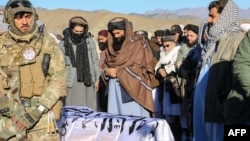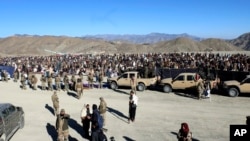Thousands of mourners assembled in eastern Afghanistan Thursday for the funeral of the high-profile Taliban minister of refugees, a day after his assassination in a suicide bombing for which a regional Islamic State affiliate has claimed responsibility.
Minister Khalil-Ur-Rahman Haqqani was targeted while he was exiting his office building in the Afghan capital, Kabul, on Wednesday, marking the most significant casualty inflicted on the Taliban since they swept back to power in August 2021.
The blast also killed and injured several ministry employees, but Taliban officials have refrained from commenting on the reported casualties from what they denounced as a "cowardly attack” against Haqqani.
The funeral was held in Haqqani’s native eastern Afghan province of Paktia, which borders Pakistan, where senior Taliban leaders, ministers, and other officials were also in attendance.
The Islamic State affiliate in Afghanistan, IS-Khorasan or IS-K, through its Amaq News Agency media wing, claimed responsibility for the attack, saying a bomber detonated an explosive vest inside the Afghan Ministry of Refugees and Repatriation.
Haqqani was listed by the United States’ Rewards for Justice website as a global terrorist and carried a $5 million bounty for information leading to his apprehension.
The 58-year-old was a central leader of the Haqqani network, a U.S.-designated foreign terrorist organization headed by his nephew, Sirajuddin Haqqani, who serves as the de facto Taliban interior minister.
The younger Haqqani also carries a $10 million bounty on his head for allegedly directing terrorist attacks against American and NATO troops until they withdrew from Afghanistan in August 2021 after nearly two decades of presence.
Wednesday’s deadly attack has drawn condemnation from the United Nations, the European Union, the Organization of Islamic Cooperation, and countries such as neighboring Iran and Pakistan, along with Qatar and Saudi Arabia.
"There can be no place for terrorism in the quest for stability," the U.N. Assistance Mission in Afghanistan (UNAMA) said on X, formerly known as Twitter, offering condolences to the victims' families.
IS-K has claimed responsibility for previous gun and bomb attacks in the country, targeting Taliban leaders, prominent religious figures loyal to them, Shi’ite community members, and foreigners.
The violence has prompted de facto Afghan authorities to conduct regular counterterrorism operations that they claim have degraded the group’s ability to pose any significant threat.
However, critics dispute Taliban claims, citing the continued launch of high-profile IS-K attacks in the country, which is reeling from years of war and natural disasters.
U.N. assessments and U.S. officials have described the group as a significant threat to Afghanistan and regional stability at large.






